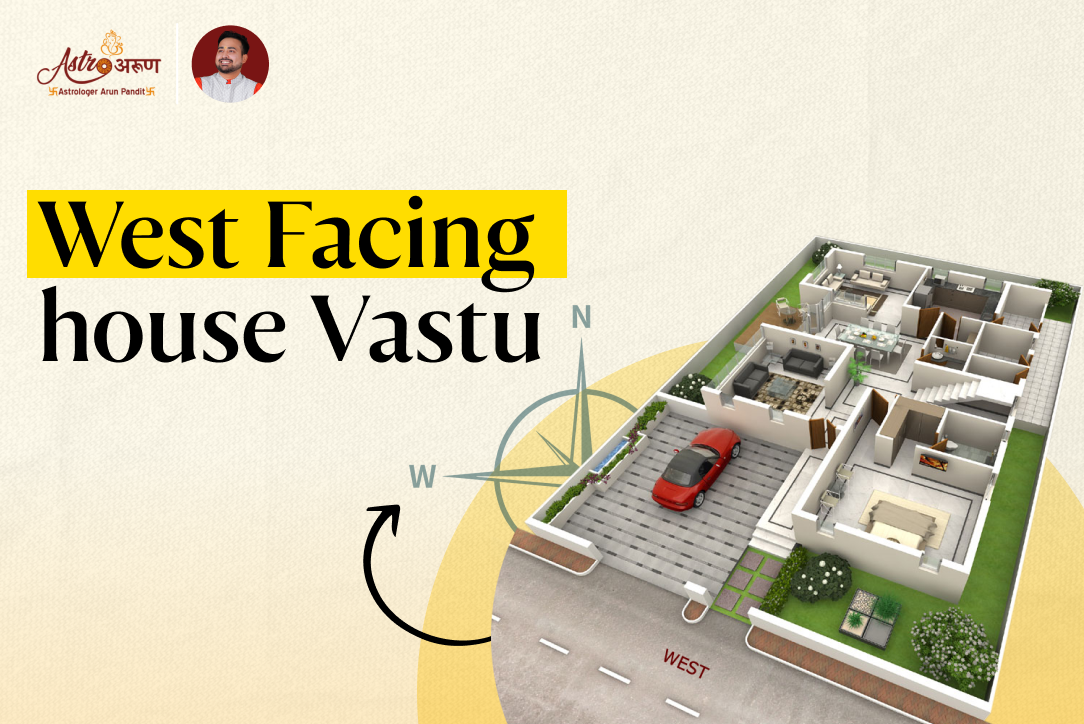Did you just avoid purchasing a house just because it was facing west? What if someone told you that such houses are unfortunate or would hinder progress? In India, house purchase is influenced by Vastu Shastra, and west-facing house vastu shastra have an undeserved negative image. They are held responsible for maladies of health, wealth, or relationships, as believed by the majority. But this may be due to ill-planned houses that are not Vastu-compliant. If the important areas like the entrance, kitchen, or master bedroom are oriented without deliberate directional treatment, they may cause energy imbalance, causing uneasiness or disrupt daily living. People most often blame the direction, which they omit, and the real problem is a poor layout.
The reality of the matter is that a west-facing house plan can be beneficial if it is built according to Vastu standards. Far from being unfortunate, such houses actually prove to be best suited for busy individuals, businessmen, and those who hold managerial roles. The setting sun’s energy yields stability, discipline, and constant development. By placing main rooms—like the front door, puja room, kitchen, and master bedroom—in their rightful positions, a west-facing house can be made into a home that enhances prosperity, peace, and progress. When executed well, it is not only a practical place to live—it is a symbol of power, lightness, and serene living.
What Does a West Facing House Vastu Shastra?
In Vastu Shastra, the orientation of a house plays a very important role in controlling the passage of energy within and out of the space. West-facing house vastu simply means that when you come out of the main entrance, you are facing west. In this manner, the house can acquire the energy of the setting sun, which is considered to be strong, dependable, and transforming. Although west-facing houses are generally misunderstood, Vastu never defines any direction to be good or bad. Everything depends on the interior planning. The interior is suitably planned as per Vastu Shastra for a west-facing home. A west-facing house can prove beneficial in terms of ambition, leadership qualities, and material gains. Poor interior arrangements, particularly in the entrance, kitchen, or master bedroom, can upset the equilibrium, causing minor or major life problems. It is for that reason that considering Vastu principles becomes important while optimizing this direction.
Benefits of West-Facing House in Vastu Shastra
The west-facing house plan is desirable in many ways if the house is constructed or positioned according to the principles of Vastu Shastra. The main advantages are as follows:
- Best for Ambitious and Career-Oriented Individuals: West-facing houses are employed to assist individuals who occupy positions of leadership, business, or career endeavors. Western sunlight is concerned with stability, maturity, and advancement, and hence is best suited for individuals who desire long-term success.
- Provides Strength and Willpower: In Vastu, the west is governed by the planet Saturn (Shani) and embodies self-control, will power, and perseverance. Dwelling in the correctly oriented west house can enhance inner strength, patience, and the capacity to remain focused under adversity.
- Encourages Financial Advancement: If the entry and inner areas are designed in accordance with Vastu principles, west-directional houses can bring monetary prosperity. Proper positioning of the puja room, kitchen, and living rooms provides a setting that is favorable to prosperity and wealth.
- Provides Balanced Energy: These houses possess the soothing impact of a setting sun. This soothing energy promotes a peaceful ambiance in the evening, allowing the residents to unwind and stay emotionally stable.
- Most suitable for Second and Third-Born Child: In accordance with traditional Vastu principles, houses facing the west are especially favorable for younger members of a family. It helps in their overall development, personality formation, and study or creative pursuits.
- Suitable for Urban Locality Plots: Where in urban designs the direction west is more accessible as per road planning or sunlight, a building facing the west direction is an acceptable option. Proper Vastu planning makes it as prosperous as a building facing the east or south direction.
Room-by-Room Vastu Placement for West-Facing Houses
West-facing homes have mixed opinions, but if planned under the principles of Vastu Shastra, they can be most helpful. Direction is not the secret to a house being good or bad — the real effect is done through the floor plan, room placement, and the flow of energy in the house. These detailed Vastu tips below shall be a master key to unlock the full potential of your west-facing home:
1. Proper Placement of Entrance
The front door is the most significant aspect of a Vastu house. In a west-facing house, the ideal position of the front door should be in the middle or to the north side of the west wall, or in what is referred to as the 3rd, 4th, 5th, or 6th padas. They are said to be strong and tend to bring wealth, luck, and opportunities. Don’t place the entrance between the 7th and 9th padas in the southwest quadrant, which will bring instability or health problems.
2. Kitchen Location and Direction of Cooking
The southeast is the Agni (fire) corner and therefore the ideal spot for the kitchen. It will bring in health and prosperity. The northwest corner is the second option. The individual needs to face east while cooking to be healthy and happy. Avoid constructing the kitchen in the southwest direction, as it may result in conflicts and tension within the family.
3. Living Room Placement
The living room or drawing room should occupy the north or northeast direction of the house. These directions provide maximum morning sunlight and get soothing, peaceful vibrations. Such a placement facilitates communication and bonding among members of the family. The living room must remain well-lit, neat, and lightly painted to avail itself of its Vastu advantages.
4. Placement of Master Bedroom
The southwest corner is optimum for placing the master bedroom for a west-facing house. Stability, dominance, and good sleep are what this direction is all about, particularly for the family head. The bed must be positioned in the south or west portion of the room, with the head facing the south or east when sleeping.
5. Puja Room or Meditation Space
In every house, the northeast corner (Ishanya) is the most sacred and divine. Having a puja room in this direction is believed to promote maximum spiritual growth, mental peace, and positivity. If the northeast direction is not possible, then the east direction is the next best. Always keep the idols or photos in a position to face the west, so that whenever you face east while praying, they are in your line of sight.
6. Staircase Direction
For houses facing west, stairs must be located in the south, southwest, or west direction. They are Vastu-friendly and ensure that upward mobility is activated. Do not locate the staircase in the northeast direction because it will hinder growth patterns and cause health problems. Spiral staircases should also be avoided, as they can disrupt the flow of energy.
7. Bathroom and Toilet Placement
Toilets and bathrooms can ideally be placed in the northwest or southeast directions of the building. These directions are best for handling waste and outgoing energy. Bathrooms should not be placed in the northeast or southwest corners since they form Vastu defects and negatively affect health and prosperity.
8. Position of Children’s Bedroom
Children’s bedrooms or study rooms can ideally be placed in the northwest or east directions. These areas offer support for creativity, discipline, and mental focus. Ensure there is sufficient light and air, and arrange the room to facilitate easy access while maintaining clarity and minimizing distractions.
Key Vastu Tips for a Positive West-Facing Home Environment
A west-facing house, if planned according to Vastu Shastra, can become both fortunate and robust. For it to become as powerful as possible, it is imperative that every section of the house be planned in detail. Below are 10 beneficial tips for a west-facing home according to Vastu that can increase energy movement, provide for well-being, and generate prosperity.
- Place Trees at Strategic Spot in Front: To avoid harsh west sunlight and to achieve thermal comfort, install tall trees in the front yard, except at the main gate. Not only is this a cooling factor in the house, but it also enhances aesthetics and encourages natural balancing of energies.
- Use Minimum Glass on West Side: Avoid huge glass windows or huge glass designs on west walls. These details lead to overheating and waste of energy. Where windows are unavoidable, use heat-reflective or tinted glass to enhance indoor comfort and protection from excessive sunlight.
- Have an Equal Number of Doors: According to Vastu, houses that have an even number of doors (2, 4, or 6) will provide smooth energy flow. It provides balance, harmony, and tranquility in the house. Always maintain doors in good condition and make sure they are able to open wide.
- Never Have More Windows on the West and South: Too many openings on the south or west side will let in too much heat and disrupt the energy balance. The windows should be given first preference on the east, north, or northeast side to let in natural light while ensuring thermal comfort and beneficial energy flow.
Common Errors to Avoid in West-Facing Homes (According to Vastu Shastra)
Despite the fact that west-facing homes have the potential to bring stability and success when properly designed, some common mistakes often go unnoticed, preventing them from reaching their full potential. Below are distinctive errors homeowners usually make — and why avoiding them is advisable:
- Overlooking Energy Zoning: Most west-oriented houses do not have favorable energy zoning, exposing peaceful zones such as bedrooms to active zones or vice versa. This results in sleeplessness, fights, and broken habits. Always arrange the setup along the natural direction of energy from west to east.
- Positioning Mirrors Relative to the Front Door: While mirrors are typically used for their decorative purposes, positioning them directly opposite the door in a west-facing home causes the positive energy to rebound instead of drawing towards it, disrupting the energy balance of the home.
- Utilization of Too Dark Interiors: West-facing houses receive natural light in the morning in small quantities. Dark-colored walls, heavy curtains, and low lighting can make the house dark and unpleasant. Earthen light colors warm and keep the house active.
- Overloading the Southwest Zone: Although the southwest corner is ideal for stability, having too many heavy objects, such as storerooms, overhead tanks, or big appliances, will lead to overgrounding that causes stagnation or being “stuck” in life.
- Forgetting Proper Ventilation: Poor cross-ventilation, particularly along the south and west facades of the house, leads to heat stagnation, stagnation of air, and discomfort. Not only does this ruin comfort, but it also hinders the flow of prana (life energy).
- Improper Placement of the Water Tank: They put the water tanks in the southwest or southeast areas, which will disturb the harmony of the fire and earth energies. It would be preferable to put water sources in the northeast or north area, where water will remain naturally.
- Misalignment of Main Gate and Main Door: If the main door entrance and the main gate are not congruent, it disorients the flow of positive energy towards the house. Misalignment is mostly unnoticed in west-facing properties and can affect prosperity and a clear mind.
Conclusion
A west-facing house as per Vastu can offer immense benefits when designed with precision and care. Many of the negative beliefs surrounding such homes stem from misaligned layouts and ignorance of Vastu Shastra for west-facing homes. By placing vital elements like the entrance, kitchen, and master bedroom in their ideal zones and avoiding typical design mistakes, you can transform your home into a source of balance, strength, and prosperity. With the right west facing house Vastu plan, this orientation not only supports ambition and growth but also fosters a calm and harmonious atmosphere for everyday living.
FAQs
1. Is a west-facing house good as per Vastu Shastra?
Yes, a west-facing house can be very auspicious if designed correctly according to Vastu principles. Success, wealth, and fame are often associated with such houses, especially for people in business or leadership roles.
2. Who should ideally live in a west-facing house?
West-facing homes are suitable for people in positions of power, politics, or business. It’s especially favorable for individuals who are focused on fame, recognition, or entrepreneurship.
3. What are the main Vastu guidelines for west-facing houses?
Key Vastu guidelines include:
- Place the main entrance in the third or fourth pada (segment) from the northwest on the west side.
- Keep the kitchen in the southeast or northwest.
- The master bedroom should ideally be in the southwest.
- Avoid having open spaces or water sources in the southwest.
4. Where should the main door be placed in a west-facing house?
According to Vastu, the main door should ideally be in the third or fourth pada (segments) of the west side, counting from the northwest corner, as these are considered the most auspicious locations.
5. Is the west direction considered negative in Vastu?
Not necessarily. While it is less commonly preferred than east or north directions, west-facing houses can bring prosperity and stability if the layout follows proper Vastu principles.
6. Can a puja room be placed in a west-facing house?
Yes, the ideal location for a puja room in a west-facing house is in the northeast corner, facing east or north, ensuring spiritual energy and positivity.
7. What should be avoided in west-facing houses as per Vastu?
- Avoid placing the main door in the southwest corner.
- Avoid having the kitchen or bathroom in the northeast.
- Do not place heavy items or staircases in the northeast.
- Avoid cutting corners or irregular plots.
8. Is a west-facing house suitable for renting or reselling?
Yes, many people prefer west-facing houses, especially in metro cities, because they get good sunlight in the evening and can be lucky for certain professions. They can have good resale or rental value when designed per Vastu.
9. How can I enhance positivity in a west-facing house?
- Use light, neutral colors on walls.
- Keep the west side clean and clutter-free.
- Place Vastu remedies like Vastu pyramids or mirrors in appropriate locations if needed.
- Ensure that sunlight enters from the north or east directions as much as possible.
10. Can a west-facing house be lucky for students?
While north or east-facing homes are traditionally preferred for academic success, west-facing houses can still be favorable if the study area is located in the northeast or east, allowing the student to face east while studying.
11. What is the significance of the west direction in Vastu Shastra?
The west direction is ruled by Varuna, the God of water, symbolizing stability, wisdom, and introspection. If balanced correctly, this direction can bring financial gains, social status, and emotional strength.
12. Can I build a staircase in a west-facing house?
Yes, but the staircase should ideally be in the south, southwest, or west part of the house. Avoid placing staircases in the northeast corner, as it may lead to financial and health issues.
13. Where should the living room be located in a west-facing house?
The living room can be placed in the north, northeast, or east part of the house. These zones promote openness, better energy flow, and are ideal for receiving guests.
14. Are there any Vastu remedies if the main door is in the wrong position in a west-facing house?
Yes, remedies include:
- Installing a Vastu pyramid above the main door.
- Placing a Swastik or Om symbol on the door.
- Using metal strips on the doorframe.
However, it’s best to consult a Vastu expert for personalized solutions.
15. Can west-facing houses have underground water tanks?
No, underground water tanks should not be placed in the west, southwest, or south directions. The best locations are the northeast or north, which attract positive energy and prosperity.
Related Blogs







